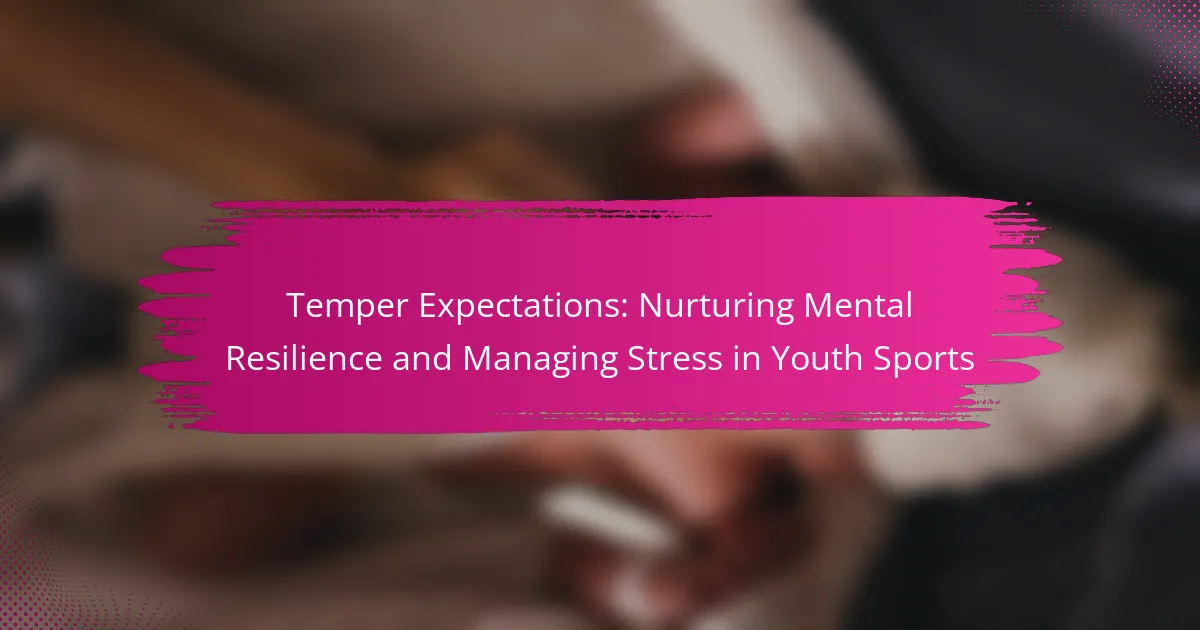Nurturing mental resilience in young athletes is essential for enhancing their performance and enjoyment in sports. Young athletes face significant stressors, including performance pressure, injuries, and balancing academics. Addressing these challenges fosters a supportive environment that promotes healthy coping strategies. By tempering expectations and focusing on personal growth, athletes can better manage stress and cultivate a positive mindset.

How does mental resilience impact youth sports participation?
Mental resilience positively impacts youth sports participation by enhancing focus and reducing anxiety. Resilient athletes are better equipped to handle pressure, leading to improved performance and enjoyment. Studies show that youth involved in sports with strong mental resilience report higher levels of satisfaction and commitment. This resilience fosters a growth mindset, encouraging continuous improvement and perseverance despite challenges.
What are the key components of mental resilience in children?
Key components of mental resilience in children include emotional regulation, problem-solving skills, social support, and a positive mindset. These attributes help children cope with stress and adversity effectively. Emotional regulation allows children to manage their feelings during challenges. Problem-solving skills enable them to find solutions when faced with obstacles. Social support from peers and adults fosters a sense of belonging and security. A positive mindset encourages optimism and perseverance, essential for overcoming difficulties. Together, these components nurture mental resilience, especially in the context of youth sports.
How can parents foster mental resilience in young athletes?
Parents can foster mental resilience in young athletes by setting realistic expectations and emphasizing effort over outcomes. Focus on nurturing a growth mindset, encouraging kids to view challenges as opportunities for learning. Teach stress management techniques, such as mindfulness and breathing exercises, to help athletes cope with pressure. Supportive communication and positive reinforcement can enhance confidence and motivation, promoting resilience in competitive environments.
What strategies can be used to build confidence?
Building confidence in youth sports involves setting realistic goals, fostering a supportive environment, and encouraging positive self-talk. These strategies nurture mental resilience and manage stress effectively.
1. Set achievable goals to provide a sense of accomplishment.
2. Create a supportive team culture that celebrates effort and improvement.
3. Encourage positive self-talk to combat negative thoughts.
4. Provide constructive feedback to enhance skills without discouragement.
5. Promote mindfulness techniques to help athletes manage stress.
These approaches build a strong foundation for confidence in young athletes.
How can goal-setting enhance resilience?
Goal-setting enhances resilience by providing clear objectives and a sense of purpose. This focus helps youth athletes manage stress and expectations effectively. Setting achievable goals fosters a growth mindset, encouraging persistence in the face of challenges. Additionally, tracking progress reinforces self-efficacy, further building mental resilience.

What are common stressors faced by young athletes?
Young athletes commonly face stressors such as performance pressure, injuries, and balancing academics with sports. These challenges can impact their mental resilience and overall well-being.
Performance pressure often stems from parental expectations, coach demands, and self-imposed goals. Injuries can create anxiety about returning to play and fear of re-injury. Balancing schoolwork and sports commitments may lead to time management issues, increasing stress levels.
Additionally, social dynamics within teams can contribute to stress. Young athletes may experience bullying, peer pressure, or conflicts with teammates. These factors can affect their mental health and enjoyment of the sport.
Addressing these stressors is crucial for fostering a supportive environment that nurtures mental resilience and encourages healthy coping strategies.
How does performance pressure affect children in sports?
Performance pressure negatively impacts children’s mental health and athletic development. It can lead to anxiety, decreased enjoyment, and burnout. Studies show that children exposed to high performance expectations may experience heightened stress, affecting their overall well-being. Fostering a supportive environment that emphasizes personal growth over competition is essential for nurturing resilience. Encouraging children to set realistic goals can help mitigate the adverse effects of performance pressure.
What role does peer competition play in youth sports stress?
Peer competition significantly contributes to stress in youth sports by creating pressure to perform. This competition often leads to heightened anxiety and fear of failure among young athletes. Research indicates that 70% of youth athletes experience stress related to competition, impacting their mental resilience. Managing expectations is crucial; focusing on personal growth rather than comparison can alleviate some of this stress. Encouraging a supportive environment helps youth athletes develop coping strategies, fostering mental resilience in the face of competitive pressures.
How can parents recognize signs of stress in their children?
Parents can recognize signs of stress in their children by observing changes in behavior, emotions, and physical health. Common indicators include withdrawal from activities, increased irritability, changes in sleep patterns, and complaints of headaches or stomachaches. Monitoring these signs can help parents support their child’s mental resilience during youth sports. Early intervention is crucial in managing stress effectively.

What unique challenges do young athletes face in team sports?
Young athletes face unique challenges in team sports, especially regarding mental resilience and stress management. Peer pressure can lead to unrealistic expectations, impacting performance and enjoyment. Additionally, the fear of failure may hinder their ability to take risks and learn. Balancing sports with academics creates added stress, often overwhelming young athletes.
Injuries present another significant challenge, affecting both physical performance and mental health. Young athletes may struggle with anxiety during recovery, fearing they will fall behind their peers. Coaches and parents play a crucial role in nurturing resilience by fostering a supportive environment and encouraging open communication about mental health.
To address these challenges, it is essential to prioritize mental wellness alongside physical training. Programs that emphasize emotional intelligence and coping strategies can empower young athletes to manage stress effectively. By tempering expectations and focusing on personal growth, athletes can cultivate a positive mindset that enhances their overall experience in team sports.
How does team dynamics influence mental health?
Team dynamics significantly influence mental health by shaping stress levels and resilience in youth sports. Positive interactions among team members enhance emotional support, reducing anxiety and fostering a sense of belonging. Conversely, negative dynamics can lead to increased stress and mental health challenges. Research indicates that supportive team environments promote mental resilience, allowing young athletes to manage stress more effectively. Building strong relationships within teams is crucial for nurturing positive mental health outcomes.
What are the effects of coach-athlete relationships on stress levels?
Coach-athlete relationships significantly influence stress levels in youth sports. Positive interactions foster trust and open communication, which can reduce anxiety and enhance performance. A study by Jowett and Cramer (2010) found that supportive coaching styles lead to lower stress levels among athletes. In contrast, negative relationships can increase pressure and hinder mental resilience. Thus, nurturing these connections is vital for managing stress effectively.

What rare attributes contribute to exceptional mental development in youth athletes?
Mental development in youth athletes benefits from rare attributes like adaptive coping strategies, emotional intelligence, and growth mindset. These qualities foster resilience, enabling athletes to manage stress effectively. Research indicates that athletes with emotional intelligence can navigate competitive pressures better, leading to improved performance and mental well-being. Additionally, a growth mindset encourages youth to view challenges as opportunities for learning, enhancing their overall development.
How can early exposure to various sports enhance mental flexibility?
Early exposure to various sports can significantly enhance mental flexibility by fostering adaptability and problem-solving skills. Engaging in multiple sports exposes youth to diverse situations, requiring quick thinking and strategic adjustments. This practice cultivates resilience, allowing young athletes to manage stress effectively during competitive scenarios. Research indicates that children involved in varied sports demonstrate improved cognitive flexibility, which translates to better decision-making in both sports and life. Such experiences nurture a growth mindset, essential for overcoming challenges and embracing new opportunities.
What are the benefits of individualized coaching approaches?
Individualized coaching approaches enhance mental resilience and stress management in youth sports by tailoring strategies to each athlete’s unique needs. These benefits include improved self-confidence, personalized skill development, better emotional regulation, and enhanced motivation. Individualized coaching fosters a supportive environment, allowing young athletes to navigate challenges effectively. As a result, athletes develop a stronger mindset, enabling them to perform under pressure and maintain a positive attitude towards competition.

What are effective techniques for managing stress during competitions?
To manage stress during competitions, youth athletes should temper expectations, focus on their efforts, and practice mindfulness techniques. Setting realistic goals reduces pressure and fosters mental resilience. Visualization can enhance confidence, while breathing exercises help maintain calmness in high-stakes situations. Regular practice of these techniques leads to improved performance and enjoyment in sports.
How can breathing exercises help young athletes?
Breathing exercises significantly enhance mental resilience and stress management in young athletes. These techniques promote relaxation, increase focus, and improve overall performance under pressure.
Practicing deep breathing can reduce anxiety levels, helping athletes maintain composure during competitions. Studies show that controlled breathing lowers heart rate and cortisol levels, fostering a calm mindset.
Incorporating breathing exercises into training routines cultivates a unique attribute: mental clarity. This clarity allows young athletes to make better decisions and enhance their competitive edge.
As a result, young athletes who regularly engage in breathing exercises demonstrate improved emotional regulation and resilience, essential for thriving in youth sports.
What role does visualization play in performance anxiety reduction?
Visualization significantly aids in reducing performance anxiety by enhancing mental resilience. It allows young athletes to mentally rehearse successful scenarios, which boosts confidence and reduces stress. Research indicates that visualization techniques can lower heart rates and improve focus during competition. By fostering a positive mindset, athletes can better manage pressure and expectations in youth sports.

What best practices can parents implement to support their children?
To support their children in youth sports, parents should nurture mental resilience and manage stress effectively. Encourage a focus on personal growth rather than competition.
Promote open communication about feelings and experiences. This helps children express stress and anxiety.
Set realistic expectations based on the child’s individual abilities and interests. This approach fosters a healthier relationship with sports.
Model healthy coping strategies, such as mindfulness and relaxation techniques. These practices can equip children with tools to handle pressure.
How can communication improve mental well-being in youth sports?
Effective communication enhances mental well-being in youth sports by fostering trust and reducing anxiety. Open dialogue allows athletes to express feelings and concerns, which builds resilience. Encouraging feedback creates a supportive environment that helps manage stress. Coaches who communicate positively can influence athletes’ self-esteem and motivation.
What common mistakes should parents avoid in youth sports?
Parents should avoid placing undue pressure on children in youth sports. This includes setting unrealistic performance expectations, which can lead to stress and anxiety. Encouraging enjoyment and personal growth fosters mental resilience. Prioritizing fun over competition helps maintain a positive experience. Additionally, parents should refrain from criticizing coaches or officials in front of their children, as this can undermine their authority and create a negative environment.
What expert insights can guide parents in nurturing resilience?
To nurture resilience in youth sports, parents should temper expectations and focus on the process rather than outcomes. This approach enhances mental resilience and reduces stress. Encourage children to set personal goals, emphasizing effort and improvement over winning. Research indicates that children who perceive support from parents develop stronger coping mechanisms. Additionally, fostering a growth mindset helps youth embrace challenges and learn from setbacks, ultimately building resilience.


